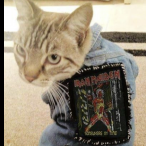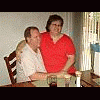Search the Community
Showing results for '"weight gain"'.
Found 15,896 results
-


Anyone forced to have LB & hate having it all the time?
wjbluv replied to DieselAngel2005's topic in LAP-BAND Surgery Forums
I apreciate you not WANTing to sound like a cold heartless a$$, but you are only reading what you want to read. Does nobody actually read an entire post? I have said many things in my posts but I don't recall talking about wanting to EAT. I said and I quote "I am looking for options on removal, but in no way am I looking for imeadiate removal. " and the reason: "One less thing to cope with and one less thing to learn to function through one less kind of pain." Which means I AM IN PHYSICAL PAIN from the band, the gas is one thing, but everytime I eat I IF I get solids I have to take TINY bites and chew VERY slowly, more so than what the doctors have explained over and over to me. THEY (meaning the doctors) unfilled me because of this... it has helped but not entirely. Nausea and shoulder pain are STILL a daily thing for me ON TOP of everything else. This has been going on Since the first day I was banded. NO WHERE DID I SAY I WANTED THE BAND OFF TO EAT!!!! Where do you get this??? I know I haven't been as successful as the rest of you but why do you think I would get it off just to EAT!!!???? I lost 35lbs my first month...I went from 292lbs - 257lb...yay me...everybody dies then unfortunatly I began drinking alchohl and fruit juice...whole milk....ice cream...mashed potatos...because A.) those were the foods I could keep down and, B.) Yes they were comfort foods. I gained back up to 278lbs and I stopped all the foolishness once I realized what I was doing...I switched to healthier semi-solid foods...I am back down to 270lbs( have since been mantaining that weight), however the weight gain I am most disapointed about was the gain of FAT and Loss of Muscle that is what really worried me... lifting weights had to stop because of port pain. stretching my arms over my head or twisting, crunches all resulted in feeling like my port was being ripped from my muscle. Curves hurts but if I start to over tax myself (unlike other gyms) no one puts me down or looks at me in disgust for taking it easy til the pain gets to an easier point and I can begin again. BUT I KEEP GOING! I have also said that I have been working to correct what I've been doing...instead of a milk and Ice cream I'm now just sipping slimfast. I can keep that down. THAT is also a baby step in the right direction is it not?? I know how big I am I know I could gain more weight with band removal...thats why I am just taking in OPTIONS. Being on the band isn't the easy way to lose weight...so why would you attack me for wanting the option of removal which is Obviously a harder way??? Instead of trying to talk me into keeping the band users attack me and call me stupid and lazy and to top it off you think I want if off for the sole pleasure of EATING? I could have kept eating the ice cream and mashed potoatos and shakes if all I really wanted was to eat because those were my comfort foods before the band anyway. But I haven't...I am 22lbs down STILL from my heaviest. What are banders who are happy with their bands doing on a thread for people who aren't happy anyway? Do you get a sick kick out of making people who probly already feel like failures feel THAT musch worse about themselves?? Do you feel better? You said come here to vent and scream and whine...I thought thats what I was doing...but as of yet you and the others have not allowed me to do so without feeling like a complete A$$. Like you said, this is MY LIFE and MY experiance how could you take what I said so personally when I've been spending all my time defending your attacks? Better question; why would I want to be a part of such a judgemental community? I thougt I was in a forum where I could complain and discuss removal without judgement. I am grateful for those who have given me the little kind support I have recieved. I'm hurt and disapointed in those of you who think I'm looking for an easy way out...by now there is no such thing as the easy way, I am damned if I remove (no tool to help in my weightloss) and damned if I leave it in (constant physical pain) -


Pouch Rules for Dummies - Found this to be interesting
shoregirl75 posted a topic in POST-Operation Weight Loss Surgery Q&A
I copied this post from an old post I found on the site from 2013. What do you think? I kind of a long read, but I has a lot of good information I thought. I was most interested about the parts that talk about the importance of making the most in the first 6 months and not to take them for granted. I am 4 1/2 month out, so It has given me a renewed sense of urgency to make the most of my "honeymoon" period. As my weight loss starts to slow more, the more worried I get about actually meeting my goal. Pouch Rules for Dummies INTRODUCTION: A common misunderstanding of gastric bypass surgery is that the pouch causes weight loss because it is so small, the patient eats less. Although that is true for the first six months, that is not how it works. Some doctors have assumed that poor weight loss in some patients is because they aren’t really trying to lose weight. The truth is it may be because they haven’t learned how to get the satisfied feeling of being full to last long enough. HYPOTHESIS OF POUCH FUNCTION: We have four educated guesses as to how the pouch works: 1. Weight loss occurs by actually slightly stretching the pouch with food at each meal or; 2. Weight loss occurs by keeping the pouch tiny through never ever overstuffing or; 3. Weight loss occurs until the pouch gets worn out and regular eating begins or; 4 Weight loss occurs with education on the use of the pouch. PUBLISHED DATA: How does the pouch make you feel full? The nerves tell the brain the pouch is distended and that cuts off hunger with a feeling of fullness. What is the fate of the pouch? Does it enlarge? If it does, is it because the operation was bad, or the patient is overstuffing themselves, or does the pouch actually re-grow in a healing attempt to get back to normal? For ten years, I had patients eat until full with cottage cheese every three months, and report the amount of cottage cheese they were able to eat before feeling full. This gave me an idea of the size of their pouch at three month intervals. I found there was a regular growth in the amount of intake of every single pouch. The average date the pouch stopped growing was two years. After the second year, all pouches stopped growing. Most pouches ended at 6 oz., with some as large at 9-10 ozs. We then compared the weight loss of people with the known pouch size of each person, to see if the pouch size made a difference. In comparing the large pouches to the small pouches, THERE WAS NO DIFFERENCE IN PERCENTAGE OF WEIGHT LOSS AMONG THE PATIENTS. This important fact essentially shows that it is NOT the size of the pouch but how it is used that makes weight loss maintenance possible. OBSERVATIONAL BASED MEDICINE: The information here is taken from surgeon’s “observations” as opposed to “blind” or “double blind” studies, but it IS based on 33 years of physician observation. Due to lack of insurance coverage for WLS, what originally seemed like a serious lack of patients to observe, turned into an advantage as I was able to follow my patients closely. The following are what I found to effect how the pouch works: 1. Getting a sense of fullness is the basis of successful WLS. 2. Success requires that a small pouch is created with a small outlet. 3. Regular meals larger than 1 � cups will result in eventual weight gain. 4. Using the thick, hard to stretch part of the stomach in making the pouch is important. 5. By lightly stretching the pouch with each meal, the pouch send signals to the brain that you need no more food. 6. Maintaining that feeling of fullness requires keeping the pouch stretched for awhile. 7. Almost all patients always feel full 24/7 for the first months, then that feeling disappears. 8. Incredible hunger will develop if there is no food or drink for eight hours. 9. After 1 year, heavier food makes the feeling of fullness last longer. 10. By drinking Water as much as possible as fast as possible (“water loading”), the patient will get a feeling of fullness that lasts 15-25 minutes. 11. By eating “soft foods” patients will get hungry too soon and be hungry before their next meal, which can cause snacking, thus poor weight loss or weight gain. 12. The patients that follow “the rules of the pouch” lose their extra weight and keep it off. 13. The patients that lose too much weight can maintain their weight by doing the reverse of the “rules of the pouch.” HOW DO WE INTERPRET THESE OBSERVATIONS? POUCH SIZE: By following the “rules of the pouch”, it doesn’t matter what size the pouch ends up. The feeling of fullness with 1 � cups of food can be achieved. OUTLET SIZE: Regardless of the outlet size, liquidy foods empty faster than solid foods. High calorie liquids will create weight gain. EARLY PROFOUND SATIETY: Before six months, patients much sip water constantly to get in enough water each day, which causes them to always feel full. After six months, about 2/3 of the pouch has grown larger due to the natural healing process. At this time, the patient can drink 1 cup of water at a time. OPTIMUM MATURE POUCH: The pouch works best when the outlet is not too small or too large and the pouch itself holds about 1 � cups at a time. IDEAL MEAL PROCESS (rules of the pouch): 1. The patient must time meals five hours apart or the patient will get too hungry in between. 2. The patient needs to eat finely cut meat and raw or slightly cooked veggies with each meal. 3. The patient must eat the entire meal in 5-15 minutes. A 30-45 minute meal will cause failure. 4. No liquids for 1 � hours to 2 hours after each meal. 5. After 1 � to 2 hours, begin sipping water and over the next three hours slowly increase water intake. 6. 3 hours after last meal, begin drinking LOTS of water/fluids. 7. 15 minutes before the next meal, drink as much as possible as fast as possible. This is called “water loading.” IF YOU HAVEN’T BEEN DRINKING OVER THE LAST FEW HOURS, THIS ‘WATER LOADING’ WILL NOT WORK. 8. You can water load at any time 2-3 hours before your next meal if you get hungry, which will cause a strong feeling of fullness. THE MANAGEMENT OF PATIENT TEACHING AND TRAINING: You must provide information to the patient pre-operatively regarding the fact that the pouch is only a tool: a tool is something that is used to perform a task but is useless if left on a shelf unused. Practice working with a tool makes the tool more effective. NECESSITY FOR LONG TERM FOLLOW-UP: Trying to practice the “rules of the pouch” before six to 12 months is a waste. Learning how to delay hunger if the patient is never hungry just doesn’t work. The real work of learning the “rules of the pouch” begins after healing has caused hunger to return. PREVENTION OF VOMITING: Vomiting should be prevented as much as possible. Right after surgery, the patient should sip out of 1 oz cups and only 1/3 of that cup at a time until the patient learns the size of his/her pouch to avoid being sick. It is extremely difficult to learn to deal with a small pouch. For the first 6 months, the patient’s mouth will literally be bigger than his/her stomach, which does not exist in any living animal on earth. In the first six weeks the patient should slowly transfer from a liquid diet to a blenderized or soft food diet only, to reduce the chance of vomiting. Vomiting will occur only after eating of solid foods begins. Rice, Pasta, granola, etc. will swell in time and overload the pouch, which will cause vomiting. If the patient is having trouble with vomiting, he/she needs to get 1 oz cups and literally eat 1 oz of food at a time and wait a few minutes before eating another 1 oz of food. Stop when “comfortably satisfied,” until the patient learns the size of his/her pouch. SIX WEEKS After six weeks, the patient can move from soft foods to heavy solids. At this time, they should use three or more different types of foods at each sitting. Each bite should be no larger than the size of a pinkie fingernail bed. The patient should choose a different food with each bite to prevent the same solids from lumping together. No liquids 15 minutes before or 1 � hours after meals. REASSURANCE OF ADEQUATE NUTRITION By taking Vitamins everyday, the patient has no reason to worry about getting enough nutrition. Focus should be on Proteins and vegetables at each meal. MEAL SKIPPING Regardless of lack of hunger, patient should eat three meals a day. In the beginning, one half or more of each meal should be Protein, until the patient can eat at least two oz of protein at each meal. ARTIFICIAL SWEETENERS In our study, we noticed some patients had intense hunger cravings which stopped when they eliminated artificial sweeteners from their diets. AVOIDING ABSOLUTES Rules are made to be broken. No biggie if the patient drinks with one meal – as long as the patient knows he/she is breaking a rule and will get hungry early. Also if the patient pigs out at a party – that’s OK because before surgery, the patient would have pigged on 3000 to 5000 calories and with the pouch, the patient can only pig on 600-1000 calories max. The patient needs to just get back to the rules and not beat him/herself up. THREE MONTHS At three months, the patient needs to become aware of the calories per gram of different foods to be aware of “the cost” of each gram. (cheddar cheese is 16 cal/gram; Peanut Butter is 24 cals/gram). As soon as hunger returns between three to six months, begin water loading procedures. THREE PRINCIPLES FOR GAINING AND MAINTAINING SATIETY 1. Fill pouch full quickly at each meal. 2. Stay full by slowing the emptying of the pouch. (Eat solids. No liquids 15 minutes before and none until 1 � hours after the meal). A scientific test showed that a meal of egg/toast/milk had almost all emptied out of the pouch after 45 minutes. Without milk, just egg and toast, more than � of the meal still remained in the pouch after 1 � hours. 3. Protein, protein, protein. Three meals a day. No high calorie liquids. Fluid LOADING Fluid loading is drinking water/liquids as quickly as possible to fill the pouch which provides the feeling of fullness for about 15 to 25 minutes. The patient needs to gulp about 80% of his/her maximum amount of liquid in 15 to 30 SECONDS. Then just take swallows until fullness is reached. The patient will quickly learn his/her maximum tolerance, which is usually between 8-12 oz. Fluid loading works because the roux limb of the intestine swells up, contracting and backing up any future food to come into the pouch. The pouch is very sensitive to this and the feeling of fullness will last much longer than the reality of how long the pouch was actually full. Fluid load before each meal to prevent thirst after the meal as well as to create that feeling of fullness whenever suddenly hungry before meal time. POST PRANDIAL THIRST It is important that the patient be filled with water before his/her next meal as the meal will come with salt and will cause thirst afterwards. Being too thirsty, just like being too hungry will make a patient nauseous. While the pouch is still real small, it won’t make sense to the patient to do this because salt intake will be low, but it is a good habit to get into because it will make all the difference once the pouch begins to regrow. URGENCY The first six months is the fastest, easiest time to lose weight. By the end of the six months, 2/3 of the regrowth of the pouch will have been done. That means that each present day, after surgery you will be satisfied with less calories than you will the very next day. Another way to put it is that every day that you are healing, you will be able to eat more. So exercise as much as you can during that first six months as you will never be able to lose weight as fast as you can during this time. SIX MONTHS Around this time, our patients begin to get hungry between meals. THEY NEED TO BATTLE THE EXTRA SALT INTAKE WITH DRINKING LOTS OF FLUIDS IN THE TWO TO THREE HOURS BEFORE THEIR NEXT MEAL. Their pouch needs to be well watered before they do the last gulping of water as fast as possible to fill the pouch 15 minutes before they eat. INTAKE INFORMATION SHEET AS A TEACHING TOOL I have found that having the patients fill out a quiz every time they visit reminds them of the rules of the pouch and helps to get them “back on track.” Most patients have no problems with the rules, some patients really struggle to follow them and need a lot of support to “get it”, and a small percentage never quite understand these rules, even though they are quite intelligent people. HONEYMOON SYNDROME The lack of hunger and quick weight loss patients have in the first six months sometimes leads them to think they don’t need to exercise as much and can eat treats and extra calories as they still lose weight anyway. We call this the “honeymoon syndrome” and they need to be counseled that this is the only time they will lose this much weight this fast and this easy and not to waste it by losing less than they actually could. If the patient’s weight loss slows in the first six months, remind them of the rules of water intake and encourage them to increase their exercise and drink more water. You can compare their weight loss to a graph showing the average drop of weight if it will help them to get back on track. EXERCISE In addition to exercise helping to increase the weight loss, it is important for the patient to understand that exercise is a natural antidepressant and will help them from falling into a depression cycle. In addition, exercise jacks up their metabolic rate during a time when their metabolism after the shock of surgery tends to want to slow down. THE IDEAL MEAL FOR WEIGHT LOSS The ideal meal is one that is made up of the following: � of your meal to be low fat protein, � of your meal low starch vegetables and � of your meal solid fruits. This type of meal will stay in your pouch a long time and is good for your health. VOLUME VS. CALORIES The gastric bypass patient needs to be aware of the length of time it takes to digest different foods and to focus on those that take up the most space and take time to digest so as to stay in the pouch the longest, don’t worry about calories. This is the easiest way to “count your calories.” For example, a regular stomach person could gag down two whole sticks of butter at one sitting and be starved all day long, although they more than have enough calories for the day. But you take the same amount of calories in vegetables, and that same person simply would not be able to eat that much food at three sittings – it would stuff them way too much. ISSUES FOR LONG TERM WEIGHT MAINTENANCE Although everything stated in this report deals with the first year after surgery, it should be a lifestyle that will benefit the gastric bypass patient for years to come, and help keep the extra weight off. COUNTER-INTUITIVENESS OF FLUID MANAGEMENT I admit that avoiding fluids at meal time and then pushing hard to drink fluids between meals is against everything normal in nature and not a natural thing to be doing. Regardless of that fact, it is the best way to stay full the longest between meals and not accidentally create a “soup” in the stomach that is easily digested. SUPPORT GROUPS It is natural for quite a few people to use the rules of the pouch and then to tire of it and stop going by the rules. Others “get it” and adhere to the rules as a way of life to avoid ever regaining extra weight. Having a support group makes all the difference to help those that go astray to be reminded of the importance of the rules of the pouch and to get back on track and keep that extra weight off. Support groups create a “peer pressure” to stick to the rules that the staff at the physician’s office simply can’t create. TEETER TOTTER EFFECT Think of a teeter totter suspended in mid air in front of you. Now on the left end is exercise that you do and the right end is the foods that you eat. The more exercise you do on the left, the less you need to worry about the amount of foods you eat on the right. In exact reverse, the more you worry about the foods you eat and keep it healthy on the right, the less exercise you need on the left. Now if you don’t concern yourself with either side, the higher the teeter totter goes, which is your weight. The more you focus on one side or the other, or even both sides of the teeter totter, the lower it goes, and the less you weigh. TOO MUCH WEIGHT LOSS I have found that about 15% of the patients which exercise well and had between 100 to 150 lbs to lose, begin to lose way too much weight. I encourage them to keep up the exercise (which is great for their health) and to essentially “break the rules” of the pouch. Drink with meals so they can eat Snacks between without feeling full and increase their fat content as well take a longer time to eat at meals, thus taking in more calories. A small but significant amount of gastric bypass patients actually go underweight because they have experienced (as all of our patients have experienced) the ravenous hunger after being on a diet with an out of control appetite once the diet is broken. They are afraid of eating again. They don’t “get” that this situation is literally, physically different and that they can control their appetite this time by using the rules of the pouch to eliminate hunger. BARIATRIC MEDICINE A much more common problem is patients who after a year or two plateau at a level above their goal weight and don’t lose as much weight as they want. Be careful that they are not given the “regular” advice given to any average overweight individual. Several small meals or skipping a meal with a Liquid Protein substitute is not the way to go for gastric bypass patients. They must follow the rules, fill themselves quickly with hard to digest foods, water load between, increase their exercise and the weight should come off much easier than with regular people diets. SUMMARY 1. The patient needs to understand how the new pouch physically works. 2. The patient needs to be able to evaluate their use of the tool, compare it to the ideal and see where they need to make changes. 3. Instruct your patient in all ways (through their eyes with visual aids, ears with lectures and emotions with stories and feelings) not only on how but why they need to learn to use their pouch. The goal is for the patient to become an expert on how to use the pouch. EVALUATION FOR WEIGHT LOSS FAILURE The first thing that needs to be ruled out in patients who regain their weight is how the pouch is set up. 1. the staple line needs to be intact; 2. same with the outlet and; 3. the pouch is reasonably small. 1) Use thick barium to confirm the staple line is intact. If it isn’t, then the food will go into the large stomach, from there into the intestines and the patient will be hungry all the time. Check for a little ulcer at the staple line. A tiny ulcer may occur with no real opening at the line, which can be dealt with as you would any ulcer. Sometimes, though, the ulcer is there because of a break in the staple line. This will cause pain for the patient after the patient has eaten because the food rubs the little opening of the ulcer. If there is a tiny opening at the staple line, then a reoperation must be done to actually separate the pouch and the stomach completely and seal each shut. 2) If the outlet is smaller than 7-8 mill, the patient will have problems eating solid foods and will little by little begin eating only easy-to-digest foods, which we call “soft calorie syndrome.” This causes frequent hunger and grazing, which leads to weight regain. 3) To assess pouch volume, an upper GI doesn’t work as it is a liquid. The cottage cheese test is useful – eating as much cottage cheese as possible in five to 15 minutes to find out how much food the pouch will hold. It shouldn’t be able to hold more than 1 � cups in 5 – 15 minutes of quick eating. If everything is intact then there are four problems that it may be: 1) The patient has never been taught the rules; 2) The patient is depressed; 3) The patient has a loss of peer support and eventual forgetting of rules, or 4) The patient simply refuses to follow the rules. LACK OF TEACHING An excellent example is a female patient who is 62 years old. She had the operation when she was 47 years old. She had a total regain of her weight. She stated that she had not seen her surgeon after the six week follow up 15 years ago. She never knew of the rules of the pouch. She had initially lost 50 lbs and then with a commercial weight program lost another 40 lbs. After that, she yo-yoed up and down, each time gaining a little more back. She then developed a disease (with no connection to bariatric surgery) which weakened her muscles, at which time she gained all of her weight back. At the time she came to me, she was treated for her disease, which helped her to begin walking one mile per day. I checked her pouch with barium and the cottage cheese test which showed the pouch to be a small size and that there was no leakage. She was then given the rules of the pouch. She has begun an impressive and continuing weight loss, and is not focused on food as she was, and feeling the best she has felt since the first months after her operation 15 years ago. DEPRESSION Depression is a strong force for stopping weight loss or causing weight gain. A small number of patients, who do well at the beginning, disappear for awhile only to return having gained a lot of weight. It seems that they almost on purpose do exactly opposite of everything they have learned about their pouch: they graze during the day, drink high calorie beverages, drink with meals and stop exercising, even though they know exercise helps stop depression. A 46 year-old woman, one year out of her surgery had been doing fine when her life was turned upside down with divorce and severe teenager behavior problems. Her weight skyrocketed. Once she got her depression under control and began refocusing on the rules of the pouch, added a little exercise, the weight came off quickly. If your patient begins weight gain due to depression, get him/her into counseling quickly. Encourage your patient to refocus on the pouch rules and try to add a little exercise every day. Reassure your patient that he/she did not ruin the pouch, that it is still there, waiting to be used to help with weight control. When they are ready the pouch can be used once again to lose weight without being hungry. EROSION OF THE USE OF PRINCIPLES: Some patients who are compliant, who are not depressed and have intact pouches, will begin to gain weight. These patients are struggling with their weight, have usually stopped connecting with their support groups, and have begun living their “new” life surrounded by those who have not had bariatric surgery. Everything around them encourages them to live life “normal” like their new peers: they begin taking little sips with their meals, and eating quick and easy-to-eat foods. The patient will not usually call their physician’s office because they KNOW what they are doing is wrong and KNOW that they just need to get back on track. Even if you offer “refresher courses” for your patients on a yearly basis, they may not attend because they KNOW what the course is going to say, they know the rules and how they are breaking them. You need to identify these patients and somehow get them back into your office or back to interacting with their support group again. Once these patients return to their support group, and keep in contact with their WLS peers, it makes it much easier to return to the rules of the pouch and get their weight under control once again. TRUE NON-COMPLIANCE: The most difficult problem is a patient who is truly non-compliant. This patient usually leaves your care, complains that there is no ‘connection’ between your staff and themselves and that they were not given the time and attention they needed. Most of the time, it is depression underlying the non-compliance that causes this attitude. A truly non-compliant patient will usually end up with revisions and/or reversal of the surgery due to weight gain or complications. This patient is usually quite resistant to counseling. There is not a whole lot that can be done for these patients as they will find a reason to be unhappy with their situation. It is easier to identify these patients BEFORE surgery than to help them afterwards, although I really haven’t figured out how to do that yet… Besides having a psychological exam done before surgery, there is no real way to find them before surgery and I usually tend toward the side of offering patients the surgery with education in hopes they can live a good and healthy life. -

5 Carbs to Call Your Friends – Yes, Even Weight Loss Surgery Patients!
Alex Brecher posted a magazine article in Food & Nutrition
1. Oatmeal. Despite its high carb count, oatmeal is one of the healthiest foods, even for weight loss surgery patients. It is a whole grain (gluten-free, if you are wondering), and is a source of soluble fiber. People who eat whole grains instead of refined ones have a lower risk of heart disease, diabetes, and weight gain. Have oatmeal with nuts or peanut butter for a little extra healthy fat and protein, and add cinnamon for a sweet flavor without sugar. No law says oatmeal needs to be sweet. Turn it into a savory bowl with a poached or hard-boiled egg, some feta cheese, and sliced cooked mushrooms. 2. Pear. Pears have a lower glycemic index and glycemic load than many other fruits, so they do not spike your blood sugar as much. They have soluble fiber, which helps lower cholesterol and blood sugar. They also provide lignans, which are heart-healthy. You can do way more with a pear than use it as a dessert or a side for cottage cheese, although those work, too! Try serving it with all-natural ham, or tossing it with mixed greens, walnuts, bell peppers, and cooked chicken breast. You can also turn it into a salsa to top fish or chicken along with diced onion, tomato, and cucumber, plus chopped cilantro and lime juice. 3. Beans. Beans are a starch you can love since they pack in the fiber and protein along with vitamins and minerals. They are linked to lower risk for certain cancers, as well. If they bother your stomach, try having small portions or using an enzyme product such as Bean-o. Kidney, pinto, garbanzo, and black beans – they’re all good! Make hummus with garbanzos and olive oil, or try vegetarian chili with beans, tomatoes, other vegetables, and seasoning. Or, make a taco salad or naked burrito with fat-free refried beans. 4. Pumpkin. Pumpkin has a medium glycemic index, but so few carbohydrates that your body will barely realize that it is there. Aside from the potassium and fiber in pumpkin, you will find amazing amounts of vitamin A in the form of beta-carotene – and that can only be a good thing after weight loss surgery. Butternut and acorn squash have a few more carbohydrates but are also excellent choices. Stir pumpkin and cinnamon into your oatmeal, or mix them into non-fat cream cheese for a flavorful, protein-packed spread or dip for apples. Add chunks of butternut squash to stew, or blend pumpkin into a soup to make it creamy. 5. Peas. Peas may have a bad reputation, but it is undeserved. Choose snow peas or sugar snap peas in the pod for a dose of vitamin C and fiber. Use them raw or lightly cooked to preserve their antioxidants and keep their glycemic load down. Use them in salads along with lettuce, chicken, and chopped vegetables, or dip them into Greek yogurt-based dips. You can also use snow and sugar snap peas in stir fry – just be sure to keep them crunchy. -
Hello! I didn't have a Mirena removed post-op (my VSG surgery is scheduled for 11/22, so I am still pre-op!), but I HAVE had a Mirena IUD removed previously. I had it replaced with a copper ParaGard IUD (which does not have any hormones) because the Mirena hormones were causing me to have cystic acne and other weird hormonal stuff (more ovarian cysts, etc.!), and I can confidently say that the removal did NOT cause any weight gain. Hopefully that is at least slightly helpful for you to hear! You may want to ask in one of the post-op forums for other experiences, as well!
-
Hi friends. I have stubbed my toe a little here in the last week and I think its because I set myself up for a hit by making myself push hard to get to that -100 number by my bandiversary and then I didn't make it by March 31 and I'm still not there. I sat down and asked myself what the heck are you doing? You're sabotaging yourself because you didn't hit a specific weight loss number and in the past I got to this magic 100 lbs off thing and then I slid back down the slope and regained it back. Maybe I'm subconsciously worried that if I pass the 100 mark I will then slide backward? Weird. I have a long way to go so I made a conscious decision today to take control back again, think about better food choices. Put tempting foods away, like hide the Easter candy, put the chips away that didn't get eaten at the neighborhood party, and if the family doesn't consume them this Sunday, to throw them away. I went back and thought about when I hit my -90 lbs at Valentines Day and maybe I should be content with about -5lbs a month at a rate of loss at this point but I think I can do better if I don't keep slipping and eating things I know I shouldn't. So tonight, I thought, what kind of a snack is low calorie and filling and I tried to eat about a 1/2 cup of cantaloupe and I couldn't believe how fast that filled me up. I obviously have restriction if that can fill me up so I need to leave 'slider' foods alone that melt or dissolve on the way down. Okay, now that is off my chest, I am looking forward to tomorrow being a better day. Also I've been taking pain pills Tylenol with Codeine and antibiotics for an abscessed tooth and I noticed that my fingers are all swollen and I had a sudden Water weight gain so I'm going to stay away from the scale and just give myself a break for a week. I had my root canal surgery today and I'm sore but I hope this will settle things. Still have to go through the process to get the crown down.. Just when I thought I was paying off last year's medical things, this is an unexpected chunk to pay.
-
Hey, Sharon - I'm not even hitting the gym 5 times a week and *I* am frustrated by my weight loss! I weighed myself today 5 days after my last weigh-in - no change! I've been doing a lot of walking, and my intake has been good. But I know I'm losing weight - I'm down another belt notch (NSV - yay!), it's just taking the scales a while to catch up. You and I have to be a little less numbers-centric - the scale will change eventually. If you're eating right and working out, the weight will come off! And if it doesn't, your body has found a way to create energy, which means scientists will come and study you in order to save the world. Scrappy: are you SURE about your intake there? If your intake is low, and you're as active as usual, you should be burning fat, and that weight gain is probably Water - some kind of hormonal situation I don't even want to THINK about! I'm, uh, sending positive (but manly! Oh so very manly!) beams to evelas...
-
I'd like to add that on my 50th birthday October 8th I weighed 181 pounds bringing my total weight loss to 50 pounds. It was the next two months that brought me along the roller-coaster of weight gain. I had my band opened in November and filled in January. It was during the time my band was opened when the gas went away. January 12th I had the new fill and 4 weeks later I had all the Fluid taken out. It was this time I realized that I was not belching all those months. I just hadn't thought about it until the fluid was taken out this last time. Now i was belching and passing gas normally. My advice to anyone having problems, don't be afraid to have the fluid taken out of your band, even if it backs you up a few months. It's worth it to rule out any issues you may be having with the band. If your problems go away when the band is open and they come back when you are tight then it has to be the band....
-


Are revisions REALLY necessary?
Aggiemae replied to Babbs's topic in Revision Weight Loss Surgery Forums (NEW!)
Revisions are only necessary if the surgery fails, which does happen with the lap band but how can removing most or all of your stomach "fail"??? Some people like to believe that if they gained back all their weight the surgery "didn't work" for them or it "failed" .Making bad choices caused the weight gain. Why they believe that ANOTHER surgery is the (magical) solution is beyond me. And expecting insurance to pay twice? Please. If the surgery they already had still works (it probably does) the patient needs to TAKE RESPONSIBILITY and do their part. The thing about this that is craziest is how often people post that there new surgeon is trying to get them approved. This seems to validate the belief that the previous surgery was somehow flawed. Sure the surgeons staff is trying to get as many pt as possible approved. That's how they make their $$$. I think a competent surgeon would have the integrity to say no. -


Weight Gained Since Having Gastric Sleeve Surgery
feedyoureye replied to sleeve 4 me's topic in POST-Operation Weight Loss Surgery Q&A
I just read this article on weight gain after weight loss... 8 pages long, but really interesting. http://www.nytimes.com/2012/01/01/magazine/tara-parker-pope-fat-trap.html?pagewanted=1&_r=3&adxnnlx=1325167965-awQ/TLyuKlv21t2HqMl8kg -


Weight Gained Since Having Gastric Sleeve Surgery
fawnb71 replied to sleeve 4 me's topic in POST-Operation Weight Loss Surgery Q&A
Newbies... Relax... Key your took do it's job and don't obsess over the numbers in a scale. Follow your plan, step on a scale once every couple weeks... Measure once a month... It will happen.. Now I have been sleeved over 2 years.. I lost a boat load (287 to 115) and an currently struggling with a 15 pound weight gain. Don't sound like much, however it seems to be a huge difference in clothes. At 115 for over a year, a size 2; to a size 10????? In a matter of 3-4 months??? This is the craziest thing ever! Sorry, just needed to vent. -


Weight Gained Since Having Gastric Sleeve Surgery
LilMissDiva Irene replied to sleeve 4 me's topic in POST-Operation Weight Loss Surgery Q&A
Personally I don't think anything really more is needed. You STILL have your sleeve, and I don't believe it was stretched out more than it really ever could be. Have you tried the yogurt volume test? You pack your sleeve with as much yogurt as you can as quickly as you can and judge exactly how much volume your sleeve can really hold that way. I'm thinking it's not as big as you might believe. Could it be you are grazing too? You fill your sleeve then wait an hour or a little longer and fill it again? That is something we always have to look out for because doing this you will eat far more calories in the day than you are burning, of course leading to weight gain. Also, slider foods being high in fat and bad carbohydrates will lead a sleever to gain weight. The unfortunate things about these "cheats" are that no weight loss surgery will ever stop this. Only our brains will. Likely you need to just start over. Perhaps with your very next meal promise to do the right thing, pick healthy Snacks and wait at least 3 hours before each time you eat. The first few days will be tough, but once you get those cravings out of your system you should be good to go. Watch your volumes too.. definitely don't go over 3 quarter cups at any one time. Blessings and I hope you can get back on track quickly. For me, winter (Holidays) has always been the toughest time of year for me. I cannot walk or do any activities outside for it's too cold and I tend to eat foods that aren't the best for me. We are all in this together! -


Weight Gained Since Having Gastric Sleeve Surgery
Ms skinniness replied to sleeve 4 me's topic in POST-Operation Weight Loss Surgery Q&A
This is such a hard journey for all of us.... I the first year, I thought I had it made. I was so success. Now over 2 years out I have had to look at my weight gain and get back on track with tracking my intake of food, weighing on a daily basis and re-establishing that "yes, I am a sugar addict." when I eat sugar, even just a bit, I will gain weight. It so sucks at times....But I did gain about 6 lbs and as I stopped the sugar intake by closely monitoring all processed foods for sugar, corn, soybeam oil, or any other hidden sugar name. I am also following the 5:2 diet plan and am getting back to my goal.....It's hard and I get so tired of it and then my old pattern of junk enters the picture for just a second, and I'm a goner.... So now I'm using my positive self talk of "I'd rather be healthy and thin than carry on all that extra weight again." It works for me right now and plus I have reverted back to my old habits from the 1st year which is: eat protein first, veggies, little to no bread or tortillas, no pasta, no rice and eating organic.... This is my life style now. Eating out I eat pretty clean too. So I can not revert back and give up on myself.....I don't want anymore surgeries unless it's a plastic surgeon for my excess skin. -


Weight Gained Since Having Gastric Sleeve Surgery
sleeve 4 me replied to sleeve 4 me's topic in POST-Operation Weight Loss Surgery Q&A
Hahahahahaha! I agree there are MANY MANY MANY Ways to modify the poll, but I really just want to know exactly what I asked. How much weight gained (IF ANY)? -


Weight Gained Since Having Gastric Sleeve Surgery
former_vbg replied to sleeve 4 me's topic in POST-Operation Weight Loss Surgery Q&A
This thread is for those longer out from their surgery. I'm not sure why the newbies keep coming in here and posting about weight gain right after their surgeries. When I catch these posts, I try to post something nice to guide them to other threads but they still keep coming in here. -
I complained to a friend about my latest plateau and she sent me the following. By Jonny Bowden, PhD, CNS When you're trying to lose weight, the question isn't whether or not you'll hit a plateau, it's when. Plateaus are like bad weather on a long hike: it's inevitable that you'll run into it, but knowing that in advance won't make it one bit less frustrating or annoying when it happens. Cheer up! Since plateaus are as common as rain, we have a pretty good idea what to do about them. At least one of the following techniques should help you break through a plateau and start losing again. 1. Be a Calorie Detective When clients tell me they've stopped losing weight, the first thing I ask is this: how many calories a day are you eating? Calories have a way of creeping up while we're not paying attention. Be brutally honest with yourself: food diary for a while is a great way to monitor this. And yes, sodas and alcoholic beverages count! A good calorie goal for dieters is your target weight times 10. 2. Change It Up When you're not making gains in an exercise program you change your routine. Same holds true with your eating plan. Low-carbers could go higher carb for a few days, high-carbers might switch to a plan like shake things up. 3. Try a Temporary Ban Food sensitivities can cause weight gain and bloat, and the frustrating thing is that most of us don't always know which foods are the culprits. So play the odds. Highest on the list of "usual suspects" are grains (wheat in particular), dairy and sugar. Temporarily ban all three and see what happens. 4. Take Your Workout Up a Notch Forget the "fat burning zone." High intensity intervals -- 30 to 60 seconds -- are the wave of the future. If you're accustomed to level three on your cardio machine, ramp it up to level 6 for a minute then slow down, catch your breath and repeat. Ever see a sprinter with love handles? Protein Studies show that higher protein diets make it easier to lose fat. Protein boosts the metabolism (in one study as much as 100 percent for 24 hours), and increases satiety, making it more likely that you won't overeat. A higher protein diet could be just what you need to break that plateau. 7. Try a Detox Unsupervised fasting is a really bad idea, but the idea of giving your system a rest makes sense. Try a "smart fast" of nothing but fruits and vegetables for a couple of days. The added Fiber is always helpful, and the massive amount of nutrients and phytochemicals is like "spring cleaning" for your sleep or medication. Take a look at what else is going on in your life that might need attention. Sometimes when you clean up the problems in one area of your life, problems in other areas just naturally take care of themselves. Anyone else out there struggling with a plateau? Some of these ideas might not be best for bandsters (i.e., instense workouts for newer bandsters), but it did give me cause to change my exercise time to evenings and decrease soy consumption.
-


How many vets are actually AT goal and staying there?
FishingNurse replied to clk's topic in WLS Veteran's Forum
Everyone posting on this thread have been my biggest motivators. I'm just shy of 2 years out, made my very modest goal at 9 months post op. It's hard sometimes to come to the site now because I always feel everyone besides me is satisfied on eating low carb, 800 cals, and 1/4 cup max per meal. I'm embarrassed, I feel like the anomaly almost... Luckily I'm 6 pounds from my low weight currently. I'm ok with that, but not HAPPY with that. I'm also kind of pissed I have to "diet" to get those stupid 6 pounds off. I could gain back all of my weight easily, but I won't. I won't go back. But it does take effort. I still have restriction with some foods but I could seriously eat 3/4 box of Cheezits in an evening, I have! Basically, I am so so happy with my sleeve but its hard to lose weight gained. The 6 pounds I'm trying to lose have been haunting me for months. All we can do is keep trying!!! -
I finally found an article about food addiction written in a way that is easily understood by all. Below you will find the normal behavior versus the addictive behavior. Here's an excerpt from that section: Dependence on food will be habitual, while addiction to food will be somewhat unpredictable (e.g., a morning cup of coffee versus the sudden, inexplicable drive to eat four servings of cheesecake) Dependence on food will have few, if any, emotional causes, but addiction to food is provoked by emotions and circumstances that cause feelings of powerlessness (e.g., a treat to get through a trying day at work versus a binge to avoid focusing on painful thoughts Dependence on food will have few, if any, emotional effects, whereas addiction to food will cause great anxiety if not properly attended to (e.g., being cranky due to caffeine deprivation versus feeling panicked because a planned binge is interrupted) Dependence on food will cause minimal interference in other areas of a person’s life, but addiction to food will disturb every aspect (e.g., a love for red wine with dinner versus preferring to eat alone for the sake of overeating) Dependence on food can be controlled at will, but food addiction appears as an unstoppable force in the person’s life (e.g., giving up pizza after noticing slight weight gain versus trying to stick to a healthy eating plan but derailing constantly; having a divided mind that seems to want opposite things) Dependence on food is pleasurable, but food addiction is a torment (e.g., traditional Christmas cookies versus the horror one has that one has eaten the whole box of cookies, coupled with the knowledge that one isn’t done yet) Dependence on food is casual, whereas food addiction appears to the addicted person to be closely tied to his or her identity (e.g., the guilty pleasure of Cheetos versus the shame and feelings of inadequacy that often accompany a binge) Perhaps one of the most important paragraphs is below: (helpful to read the entire article) What happened in this scenario demonstrates what, for many people, is the central issue of food addiction. Bingeing allows the food-addicted person to avoid dealing with threatening emotions (such as his or her perceived failure, powerlessness, or inferiority) by replacing them with guilt and shame, which are also threatening, but in a familiar, almost comfortable way. In the mind of the food-addicted person, the pivotal issue is lack of willpower. But in truth, they are using food to defend themselves against the pain in their life. By facilitating this transfer and avoidance of emotions, food has become a drug, and it is at this point that the food-addicted person needs to seek help. Bingeing has a different meaning for most people. When I was obese I thought it meant that you ate in the closet in the dark with a whole package of Oreos and a gallon of milk. Of course I didn't do that so I didn't think it applied to my behavior. (umm...denial) Finally I realized that my weekend routine of buying a huge Bucket 'O Chicken and locking myself in my apartment from Friday evening until going to work on Monday morning was certainly a form of bingeing. The same thing applied to my Quarter Pounder with Cheese obsession. I'm sure the Dallas quarterly earnings dropped significantly around the time I woke up to my dependence on this junk food. Most importantly please, please, please....do not walk the path of shame. From that same paragraph the very important part of the article... "In the mind of the food-addicted person, the pivotal issue is lack of willpower. But in truth, they are using food to defend themselves against the pain in their life." How sad it is that we are just trying to avoid the pain of life by using food. The problem is that it never works without paying a great price. Ask for help, educate yourself, and know that freedom from this disease is truly possible.
-


Helping the MD's!
Inner Surfer Girl replied to Connie Stapleton PhD's topic in Weight Loss Surgery Magazine
Thank you for sharing. I am not a physician but consider myself literate and pretty well educated, but I too had trouble following much of what he was trying to say (and I have read up on the study/studies? he seems to be relying on). For instance "gaining the weight". Does he mean gaining weight? Gaining some weight? Gaining more weight? I could go on... Another big piece that is missing is how the medical community in general treats obese patients. There is a recent thread on BariatricPal that has some real horror stories. Unfortunately, they seem to be more common than not. I agree that General Practitioners and other MDs need a great deal of education about obesity, weight loss surgery, and post-surgery care, however far after surgery. You are spot on when you note that too many post-op patients are thrown to the wolves post-op when it comes to mental health issues. I will definitely have to think about this to see what additional response I could provide. -


Looking for July Sleevers!
MB40buf replied to fearnot's topic in PRE-Operation Weight Loss Surgery Q&A
I think I have hit the 3 week plateau/1 pound weight gain, but I wanted to double check I have my numbers on things all right. I posted this as it's own threads but I did not get a lot of great answers so I am just trying "Julyers." Is it 60-80 grams of Protein a day? 64oz of Water but do Protein Shakes count towards that number ? 1000-1200 calories a day? (I am only 4' 10") Is there a fat, carbs, to protein ratio or anything? Using my fitness pal to track my calories, carbs, protein, fat . . . Is their a maximum amount of carbs/sugar per Protein Shake? I had to stop Bariatric Fusion because I could not take it post surgery. 30 minutes no liquids before eating and 45 minutes post eating? No more than 4oz of protein shake or protein Soup at a time to avoid stretching stomach? At least 30 minutes of cardio a day? Any certain amount of fruits or vegetables? Anyone have any tips? Just discouraged! I am just about to get below 200 and have lost about 30 pounds since surgery so being stuck is playing a mental game. -
After my surgery (3/8), My Surgeon gas me two (2) pills to take in case of diarrhea. I would call so that they can give you something. I haven't had to take them, but they gave them to me. The weight gain - you won't really know anything until you get the diarrhea under control - STAY POSITIVE!!
-


Weight Gained Since Having Gastric Sleeve Surgery
earnestclark replied to sleeve 4 me's topic in POST-Operation Weight Loss Surgery Q&A
I got on today looking for weight gain info. I am 4 months out and lost 60 lbs but gained 2lbs in the last few days. Thanks for all the great advice. I haven't journaled so I'm going to work on that. -
Hi All, My name is Holly. I'm 46 (actually had to think a bit before I remembered!! - Just shows I really am 46!), have been married to the same wonderful man for 27 years, and have a beautiful, kind, intelligent, hard-working 16 year old daughter. We are a homeschooling family living in southwest Louisiana and I am a licensed florist - currently unemployed by choice. I'm get tired of talking about my weight gain/loss/gain/loss/gain history so if it's ok I'll just post my stats. highest/surgery/current (total loss) 400+/403/343/ (-60) (Edited because I forgot to say some things)
-


FEBRUARY SLEEVERS 2013....how you doing after you've been Sleeved
Chelenka replied to DivaNurse's topic in Gastric Sleeve Surgery Forums
I haven't had any weight gains but a couple of slow weeks where I lost only a pound or maybe 1/2 pound. I seem to average about 1&1/2 lb a week. I battle head hunger a lot too but I seem to have better self-control most of the time now than I ever had before surgery. I do eat things occasionally that are less than helpful choices for weight loss but I can't eat very much so it hasn't hurt me do far. Very sugary foods make me nauseous so I don't want that stuff as much, LOL! I crave a bowl of cereal sometimes so I have a little 1/2 cup custard bowl for that. Cracks me up when I think how much I used to eat. I suggest you try upping your daily calories to 1000 and add in some more protein and also a little omega 3 fats like avocado, egg, olive oil and see if that helps with the head hunger. The omega 3 fats are very important for the sense of satiation and for your overall health. pre-surgery weight 325; surgery date 2/28/2013; surgery weight 307; 8 weeks past-op weight 281.4; 12 weeks post-op 274 -


FEBRUARY SLEEVERS 2013....how you doing after you've been Sleeved
Chelenka replied to DivaNurse's topic in Gastric Sleeve Surgery Forums
We are all in the same boat, struggling with post-holiday weight gain, old, destructive eating habits coming back, and lack of exercise (other than shoveling snow). First of all I would gently suggest that you may have a sugar addiction. I know I do. So stop with the sweet tea and the cookies. You know what you need to do. I wasn't going to come back here either cuz I didn't like the new app but realized that I really need the support. So I'm back, hangin around. Check out the Valentine's Day challenge. That might help you get motivated. You are really close to goal, as am I, and I just need a little kick in the butt to get myself going again. Tell your hubby that you need his support and find out why he's potentially sabotaging you. He might think that you look just fine now or maybe he's tired of hearing you talk about the struggle. Up to you to have that conversation. For myself, it's the realization that I can't afford to become complacent about what I'm eating and not track my food. Otherwise, it's a quick and slippery slide back UP the scale! -


Worried that doctor made my pouch too big?
Tracyringo replied to Coexister's topic in Revision Weight Loss Surgery Forums (NEW!)
Are you revising because of reflux, weight gain, or both? Not having restriction wont keep you from losing weight if that is what you are worried about. In fact I lost 12 lbs the first month after revision and weighed 180 at the time. In 2017 I weighed 296 the day of VSG surgery and only lost 14 lbs. You wont overeat because you will get sick and if you dump that is just as bad. ( at least it is for me lol ) I get violently ill and can lasts a few hours. Once it lasted 4 hours. Good luck to you !











